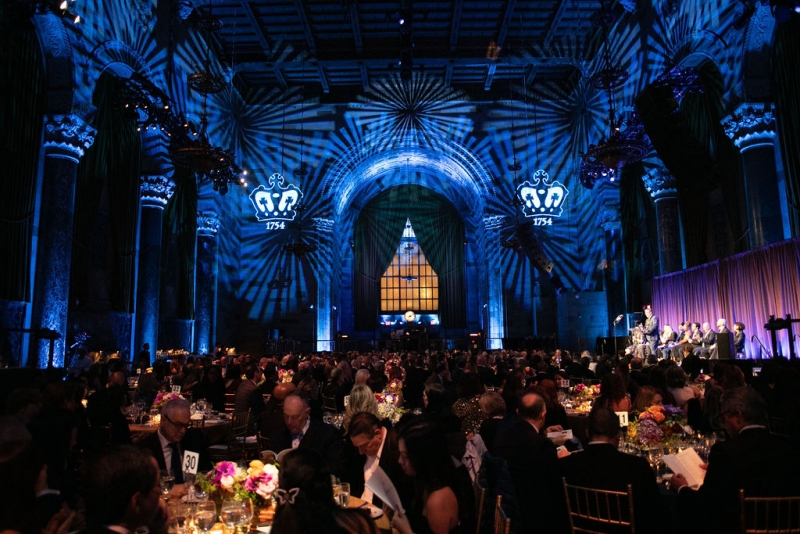
DAVID DINI SIPA’14
The 45th annual John Jay Awards Dinner was held on March 5, honoring five College alumni for distinguished professional achievement. The event raised more than $1.1 million for the John Jay Scholars Program, which provides financial support and academic programming for the most outstanding first-years entering the College.
The newest class of John Jay Award honorees are the Hon. Rolando T. Acosta CC’79, LAW’82, a New York trial and appellate judge for more than 25 years; John A. MacPhee CC’89, PH’12, CEO of The Jed Foundation, a nonprofit dedicated to safeguarding mental health for teens and young adults; Katharina Otto-Bernstein CC’86, SOA’92, an award-winning filmmaker and producer; Blondel A. Pinnock CC’90, president and CEO of the Bedford Stuyvesant Restoration Corp., the nation’s first community development corporation; and Steven S. Stuart CC’86, a managing director at Fortress Investment Group.
The dinner was held in its signature location, Cipriani 42nd Street; about 450 people were in attendance. The rain falling outside was no match for the warm mood set by the Columbia blue lighting and iconic crowns projected onto the walls in Cipriani’s main room. They left no room for doubt: This was the College’s night.
Dean Josef Sorett addressed the evening’s significance on several levels. “The Jay, each year, captures the fact of who we are, at our best,” he said, pointing to the example set by the five honorees; while the John Jay Scholars Program is an embodiment of “the College’s commitment to its core mission, insofar as it pursues the best possible student experience — by prioritizing the resources to bring exceptional students to the College, by supporting every student’s ability to thrive in a holistic sense and by cultivating in them the capacity to take on the hardest questions of our times.”
But this year’s dinner also came with an additional important opportunity, Sorett said, for reflection: “A chance to reaffirm the principles that guide us, to ground us in the tangible impact each of us can and do make, and to rededicate ourselves to this institution and everything it represents.”
Other speakers included Columbia College Alumni Association president Raymond H. Yu CC’89, SEAS’90; Claire C. Shipman CC’86, SIPA’94, co-chair of the Columbia University Board of Trustees; and Theodore Taplitz CC’25, who described highlights of his experience as a John Jay Scholar. Interim President Katrina Armstrong recalled when she stepped into her role last August, including her deep belief “in the mission of universities to educate, to create new knowledge and to move society forward.”
Since then, Armstrong continued, “I have had the privilege of witnessing this every day. In meetings with students, I hear about how Columbia pushed them to be the best versions of themselves, to take on challenges they never thought they could handle, and to do so because of the experience of being a Columbian — because of the skills, knowledge and confidence they gain while being here. Every John Jay Scholar embodies this spirit.”
The honorees gave acceptance speeches that reflected on how their College experience shaped them personally as well as professionally. By turns they spoke with humor and humility, expressing gratitude for friendships made, for the influence of faculty, and for the support of Columbia’s staff and administration.
MacPhee candidly acknowledged his struggles as an undergraduate. “The city, the academics, the financial pressures, trying to balance basketball and coursework — it overwhelmed me,” he said. He added that he was sharing his story “because students should know that struggling is OK. If your grades aren’t what you hoped, if you feel untethered or lost, it doesn’t mean you don’t belong or that you will not thrive in life. You do and you will. The magic of Columbia for me was its supportive community.”
Acosta noted that Columbia’s significance in his life extended far beyond giving him the opportunity to be the first in his family to earn a college degree. “Columbia gave me a broader intellectual understanding of the many lessons that I learned from my parents,” he said, “especially about the value of contribution — that I can find fulfillment by engaging in activities larger than myself. … It shaped my interest in public interest law and public service, in cherishing the rule of law and the pillars that undergird what we have found to be a very fragile democracy.”
Pinnock, who was also the first in her family to graduate from college, credited Columbia with being “a transformative force” that shaped her as a person and a leader: “Like so many of us in this room, my time at Columbia was a rite of passage,” she said. “A place where I discovered my purpose, learned the power of creating community and embraced the importance of giving back.”
Stuart spoke to the differences between his experience at Columbia in the 1980s and now, saying that for all that has changed, “I am comforted by the fact that Columbia has maintained the Core Curriculum. It’s still a place where students will make lifelong friends and experience life in the greatest urban campus in America, in the greatest city in the world.”
For Otto-Bernstein, “A Columbia liberal arts education provided the academic playground elemental for somebody who wants to work in the creative arts. Like Forrest Gump’s proverbial box of chocolates,” she said, “you can pick from countless fields of study. You never knew what you were going to get, but you could explore, experiment and allow the imagination to roam freely.”
The evening closed with a performance by the Columbia Kingsmen.